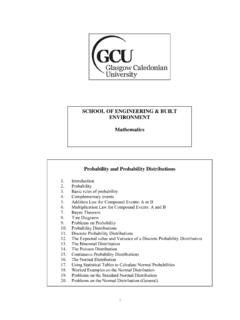Transcription of RESEARCH ETHICS PRINCIPLES AND PROCEDURES
1 RESEARCH ETHICS PRINCIPLES AND PROCEDURES . Updated December 2013, January/February 2014/April 2015. RESEARCH ETHICS PRINCIPLES and PROCEDURES : Revised 2014-2015. 1. FOREWORD. All RESEARCH involving human participants and including human tissue conducted by staff and students of the University are subject to ethical scrutiny and approval. This requirement is derived from the University's Code of Good Practice in RESEARCH and the Concordat to Support RESEARCH Integrity. It applies to all levels of study, to funded and unfunded RESEARCH , the use of simple questionnaires as well as to more complex RESEARCH carried out in educational, health, social care or prison settings.
2 This is in addition to compliance with any conditions of grant specified by a RESEARCH funder. The majority of the work involved in ethical scrutiny and approval will be carried out by the School/GCU Lead ETHICS Committees (researchers located outwith Schools/GCU Lead will seek approval through the appropriate subject area School ETHICS Committee). The University RESEARCH ETHICS Committee deals with RESEARCH involving major invasive methods or PROCEDURES and has an overall monitoring and audit function. Schools/GCU Lead are advised to model their ethical application forms on the guidance contained within this document but may make adaptations in line with codes of conduct published by professional, statutory or regulatory bodies.
3 Schools/GCU Lead must also ensure that the requirement to seek ethical approval for RESEARCH involving human participants is noted clearly in dissertation guidelines for students and that sufficient time for ethical approval is allowed when applying for RESEARCH grant. The PRINCIPLES and guidelines contained within this document have been developed by the University RESEARCH ETHICS Subcommittee to clarify the responsibilities of staff and to support them in achieving ethically sound RESEARCH practice in their own and their students' work.
4 Section 1 provides an outline of ethical PRINCIPLES to guide decision making. Section 2 details the operation of the University RESEARCH ETHICS Subcommittee and the process for making an application to it or to School ETHICS Committees. Section 3 provides detail on RESEARCH carried out in National Health Service (NHS) and/or Community Care settings under the Scottish Executive's RESEARCH Governance Framework for Health and Community Care in Scotland (RGF) Second Edition, This document should be read in conjunction with the University's Code of Good Practice in RESEARCH , UKRIO Code of Good Practice in RESEARCH and the RCUK Policy and Code of Conduct on the Governance of Good RESEARCH Conduct.
5 The University supports the PRINCIPLES of the Concordat to Support RESEARCH Integrity. 1. Under the requirements laid down in the for Health and Community Care in Scotland, all RESEARCH conducted in the NHS and Community Care settings (whether it involves staff, patients, buildings or equipment) will require approval by an NHS Committee. This applies also to RESEARCH carried out by undergraduates and postgraduates. Researchers are asked to refer to the integrated RESEARCH Application system ( iras ) website and to their School ETHICS Committee chair for guidance.
6 RESEARCH ETHICS PRINCIPLES and PROCEDURES : Revised 2014-2015. 2. CONTENTS. Page Foreword Section 1. Ethical PRINCIPLES to guide RESEARCH involving human participants Introduction 1. The main ethical PRINCIPLES 1. The two rules of veracity and confidentiality 3. Section 2. PROCEDURES for ethical approval and monitoring of RESEARCH involving human participants The University Scrutiny Process 4. The University's RESEARCH ETHICS Subcommittee Composition and Terms of Reference 4. University PROCEDURES - non-invasive, minor invasive and major invasive RESEARCH methods and PROCEDURES 5.
7 PROCEDURES for seeking ethical approval 6. Disclosure PROCEDURES and the Protecting Vulnerable Groups Scheme 6. Application to a School ETHICS Committee 7. Scrutiny of RESEARCH involving non-invasive or minor invasive RESEARCH methods 7. RESEARCH submitted for external scrutiny 7. Consideration of undergraduate and taught postgraduate empirical project work 8. Reporting mechanism 9. Submissions to the University RESEARCH ETHICS Subcommittee for approval 9. Clinical Trials 10. Additional Information 10. Section 3. RESEARCH Governance Framework for Health and Community Care, NHS RESEARCH and the iras .
8 Process RESEARCH Governance Framework 10. NHS setting 10. NHS Committee and iras 10. NHS Passport 10. Clinical Trials and MHRA 10. Treaty of Helsinki 11. Sponsorship signatory 11. RESEARCH ETHICS PRINCIPLES and PROCEDURES : Revised 2014-2015. 3. SECTION 1. Ethical PRINCIPLES to guide RESEARCH involving human participants Introduction This section provides an outline of the main PRINCIPLES that are the foundation for sound ethical practice in RESEARCH . It is essential for researchers to gain an understanding of these PRINCIPLES because there are few absolute rules' to guide the ethical conduct of empirical work.
9 Rather researchers use these PRINCIPLES to guide their decisions about how to treat their RESEARCH participants and the data that they gather about them. For most RESEARCH within the University, researchers will find that these decisions are straightforward. However in some cases deciding on an acceptable ethical approach within a study may be more challenging. In such cases, discussion with members of the School or University RESEARCH ETHICS Subcommittee should provide a resolution to any difficulty. The Main Ethical PRINCIPLES According to one of the most widely quoted ETHICS texts there are four clusters' of moral PRINCIPLES which provide a framework for making decisions about the ethical aspects of a study [Beauchamp and Childress 2001].
10 These are: * Respect for autonomy * Non-maleficence * Beneficence * Justice Respect for autonomy Respect for autonomy refers to the requirement to ensure that RESEARCH participants are entirely free to make a choice about their participation in a RESEARCH study. In order to be in a position to make such a choice they must be given sufficient information about the RESEARCH and what participation involves, they have to be sufficiently competent to understand this information and to understand it to their own satisfaction.





